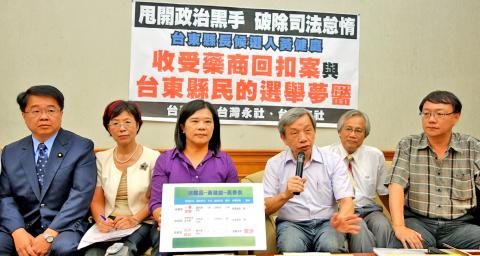Legislators and representatives of civic groups yesterday berated the judiciary for what they said was six years of inaction over a corruption case involving Taitung County Commissioner Huang Chien-ting (黃健庭).
Huang was charged with corruption in 2008, when he was a Chinese Nationalist Party (KMT) legislator.
He allegedly received bribes and kickbacks from pharmaceutical companies for helping secure drug supply contracts for public hospitals and clinics in Taitung County. Six years on, the remains in the preliminary stages in court, and Huang is running for re-election as county commissioner.

Photo: Liu Hsin-de, Taipei Times
Taiwan Society president Chang Yen-hsien (張炎憲) told a news conference in Taipei that there were very unusual and suspicious circumstances surrounding Huang’s case, since the judiciary has not moved against him.
“It is a miscarriage of justice, because the judiciary appears to be showing favoritism to Huang, a KMT member,” Chang said.
“Who is manipulating our judiciary system behind the scenes?” Chang said, adding that President Ma Ying-jeou (馬英九) and National Security Council Secretary-General King Pu-tsung (金溥聰), a long-time top aide to Ma, might be responsible.
“Ma and King have the power to manipulate the judiciary. They have interfered to protect their political ally, Huang. It is very worrying to see such abuse of political power,” Chang said.
“How can people trust the judicial system? People see it becoming an instrument to protect KMT politicians and officials. By stalling legal proceeding, people affiliated with the KMT can escape prosecution and can get away with their pervasive corruption and profiteering actions,” he said.
Democratic Progressive Party (DPP) Legislator Wu Ping-jui (吳秉叡) said the initial stage of most cases is wrapped up in 16 months.
“Why is this corruption case against Huang now in its sixth year? Why has there been no progress? Wu said.
Huang served out his term as legislator, was able to win election as Taitung County commissioner and is now running for a second term, which means “all Taitung residents could be losers in this affair because they might be voting for someone who could be found guilty of corruption,” Wu said.
DPP Legislator Wu Yi-chen (吳宜臻) criticized the judicial system for meting out different treatment based on political party affiliations.
“We keep on seeing the judiciary taking a delayed approach or no action when dealing with cases involving KMT and pan-blue camp people. However, the judiciary always moves swiftly in cases involving the DPP and the pan-green camp,” Wu said.
“The judicial system is showing its double standards and favoritism in this case. It has taken no action, no legal proceedings against Huang, although there is enough evidence against him. The judiciary is treating people of Taitung as fools,” she said.
Wu said it was obvious there has been a political pressure on judges against moving on this case.
“We see the KMT leaders subverting and destroying Taiwan’s judicial system. How long can the judiciary remain a tool of the KMT? The public will no longer have faith in the fairness and equality of our justice system,” she said.

SECURITY: As China is ‘reshaping’ Hong Kong’s population, Taiwan must raise the eligibility threshold for applications from Hong Kongers, Chiu Chui-cheng said When Hong Kong and Macau citizens apply for residency in Taiwan, it would be under a new category that includes a “national security observation period,” Mainland Affairs Council (MAC) Minister Chiu Chui-cheng (邱垂正) said yesterday. President William Lai (賴清德) on March 13 announced 17 strategies to counter China’s aggression toward Taiwan, including incorporating national security considerations into the review process for residency applications from Hong Kong and Macau citizens. The situation in Hong Kong is constantly changing, Chiu said to media yesterday on the sidelines of the Taipei Technology Run hosted by the Taipei Neihu Technology Park Development Association. With

A US Marine Corps regiment equipped with Naval Strike Missiles (NSM) is set to participate in the upcoming Balikatan 25 exercise in the Luzon Strait, marking the system’s first-ever deployment in the Philippines. US and Philippine officials have separately confirmed that the Navy Marine Expeditionary Ship Interdiction System (NMESIS) — the mobile launch platform for the Naval Strike Missile — would take part in the joint exercise. The missiles are being deployed to “a strategic first island chain chokepoint” in the waters between Taiwan proper and the Philippines, US-based Naval News reported. “The Luzon Strait and Bashi Channel represent a critical access

CARROT AND STICK: While unrelenting in its military threats, China attracted nearly 40,000 Taiwanese to over 400 business events last year Nearly 40,000 Taiwanese last year joined industry events in China, such as conferences and trade fairs, supported by the Chinese government, a study showed yesterday, as Beijing ramps up a charm offensive toward Taipei alongside military pressure. China has long taken a carrot-and-stick approach to Taiwan, threatening it with the prospect of military action while reaching out to those it believes are amenable to Beijing’s point of view. Taiwanese security officials are wary of what they see as Beijing’s influence campaigns to sway public opinion after Taipei and Beijing gradually resumed travel links halted by the COVID-19 pandemic, but the scale of

Pope Francis is be laid to rest on Saturday after lying in state for three days in St Peter’s Basilica, where the faithful are expected to flock to pay their respects to history’s first Latin American pontiff. The cardinals met yesterday in the Vatican’s synod hall to chart the next steps before a conclave begins to choose Francis’ successor, as condolences poured in from around the world. According to current norms, the conclave must begin between May 5 and 10. The cardinals set the funeral for Saturday at 10am in St Peter’s Square, to be celebrated by the dean of the College